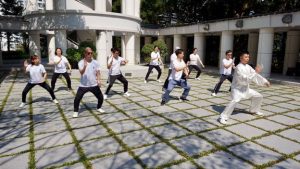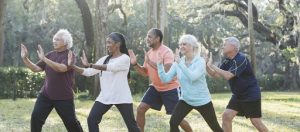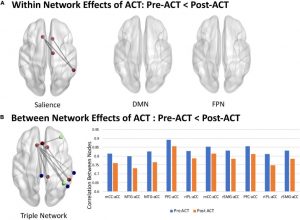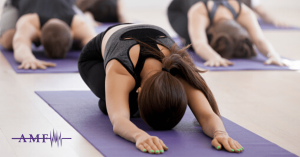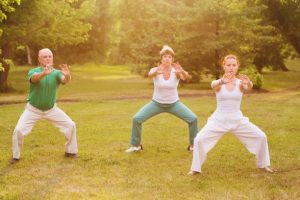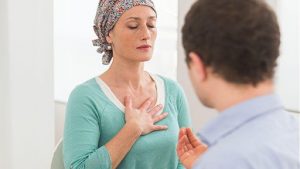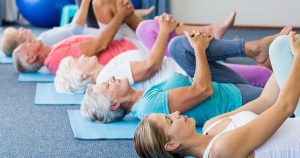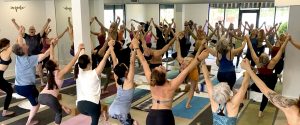Improve Physical Fitness and Quality of Life of Substance Abusers with Mind-Body Practices.
By John M. de Castro, Ph.D.
“Available data suggest that mindfulness-based interventions may help significantly reduce the consumption of several substances including alcohol, cigarettes, opiates, and others.” – NCCIH Clinical Digest
Substance abuse is a major health and social problem. There are estimated 22.2 million people in the U.S. with substance dependence. It is estimated that worldwide there are nearly ¼ million deaths yearly as a result of illicit drug use which includes unintentional overdoses, suicides, HIV and AIDS, and trauma. Obviously, there is a need to find effective methods to prevent and treat substance abuse. There are a number of programs that are successful at stopping the drug abuse, including the classic 12-step program emblematic of Alcoholics Anonymous. Unfortunately, the majority of drug and/or alcohol abusers relapse and return to substance abuse.
Hence, it is important to find an effective method to treat substance abuse and prevent relapse but an effective treatment has been elusive. Most programs and therapies to treat addictions have poor success rates. Recently, mindfulness training has been found to be effective in treating addictions. Mind-Body practices such as yoga has been found to be effective in treating substance abuse and Tai Chi practice has also been found to improve addiction recovery.
In today’s Research News article “Long-Term Effects of Mind-Body Exercises on the Physical Fitness and Quality of Life of Individuals With Substance Use Disorder-A Randomized Trial.” (See summary below or view the full text of the study at: https://www.ncbi.nlm.nih.gov/pmc/articles/PMC7775308/ ) Zhu and colleagues recruited men who were being treated for a substance use disorder (Amphetamines). They were randomly assigned to receive either 20 minutes, 3 times daily, 5 days per week, for 3 months of mind-body exercise or recreational activities. The mind-body exercises were selected from Tai Chi, Qigong, and Yoga movements. They were measured before and after training and 3 months later for physical fitness, physical, mental, social, and physical symptoms quality of life.
They found that in comparison to baseline and the recreational activities group, the group that performed mind-body exercises had significant reductions in body mass index (BMI), systolic and diastolic blood pressure, and heart rate, and significant increases in sit-and-reach, cardiovascular endurance, and physical, mental, social, and physical symptoms quality of life. These improvements were present at the endo of training and 3 months later at follow-up.
The results are clear. Mind-body exercise significantly improved the physical fitness and psychological well-being of the participants. The form of exercise was unique containing components from Tai Chi, Qigong, and yoga practices. But previous research has demonstrated physical and psychological improvements in a variety of healthy and ill individuals with Tai Chi and Qigong and also yoga practices. So, it is not surprising that using selective components of these practices would also have these benefits. But the study is unique in applying these practices to men recovering from amphetamine abuse. Although not reported, it would be expected that these benefits would help them with recovery from substance use disorder.
So, improve physical fitness and quality of life of substance abusers with mind-body practices.
“What does this mean for treatment practice or for an addict in recovery? At their core, mind-body therapies improve overall mental and physical health while improving brain function.” – Constance Scharff
CMCS – Center for Mindfulness and Contemplative Studies
This and other Contemplative Studies posts are also available on Google+ https://plus.google.com/106784388191201299496/posts and on Twitter @MindfulResearch
Study Summary
Zhu, D., Jiang, M., Xu, D., & Schöllhorn, W. I. (2020). Long-Term Effects of Mind-Body Exercises on the Physical Fitness and Quality of Life of Individuals With Substance Use Disorder-A Randomized Trial. Frontiers in psychiatry, 11, 528373. https://doi.org/10.3389/fpsyt.2020.528373
Abstract
Background: Mind-body exercises (MBE) are sequences of low to medium-intensity activities that benefit healthy performers physically and mentally. In contrast to the unmodified application of traditional tai chi, qi gong, or yoga in the healthy population, MBEs are typically tailored for individuals with substance abuse disorder (SUD). Despite numerous applications in practice, the detailed effects of tailor-made MBEs for SUD are unclear.
Objectives: This study aimed to analyze and compare changes in the physical fitness and quality of life of individuals with SUD that underwent conventional or tailor-made MBEs.
Methods: A total of 100 subjects obtained from the Shanghai Mandatory Detoxification and Rehabilitation Center with SUD were randomly assigned into two groups. The subjects in the experimental group (n = 50) practiced tailored MBE for 60 min a day, five times a week, for 3 months. The subjects (n = 50) in the control group were treated with conventional rehabilitation exercises with the same intervention protocol. The outcomes of fitness and quality of life for drug addiction were measured at the beginning and after 3 and 6 months by a questionnaire (QOL-DA). A two-way repeated measure analysis of variance was applied to compare the difference of treatments in the two groups.
Results: Statistically significant differences for the experimental group were found in systolic (p < 0.01, η2 = 0.124) and diastolic blood pressure (p < 0.01, η2 = 0.097), pulse (p < 0.01, η2 = 0.086), vital capacity (p < 0.05, η2 = 0.036), flexibility (p < 0.01, η2 = 0.143), and aerobic endurance (p < 0.01, η2 = 0.165). Results of the QOL-DA showed statistically significant differences between the experimental and control groups in total score (p < 0.01, η2 = 0.158) with greater effects on the former.
Conclusions: This study provided evidence that tailored MBE could lead to remarkable effects with regard to blood pressure, vital capacity, flexibility, and aerobic endurance in comparison with conventional rehabilitation methods.
https://www.ncbi.nlm.nih.gov/pmc/articles/PMC7775308/
